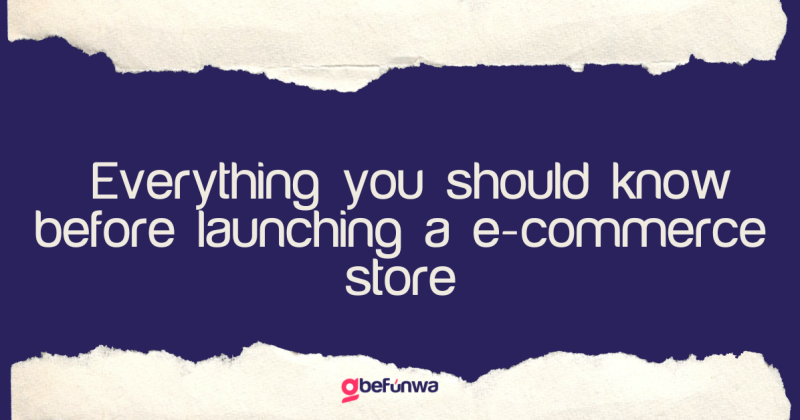
Starting an e-commerce store can be an exciting and rewarding venture. However, it’s crucial to be well-prepared and informed before taking the plunge. To set yourself up for success, we’ve compiled a list of essential considerations you should know before launching your ecommerce store. Let’s explore these factors and pave the way for a thriving online business. You can also check out our earlier article on how to set up a Woo-Commerce store

Target Audience Research:
Before starting your e-commerce store, thoroughly research your target audience. Understand their demographics, preferences, shopping habits, and pain points. Tailor your product selection, branding, and marketing strategies to align with the needs and desires of your potential customers.
Competitive Analysis:
Analyze your competitors within the e-commerce market niche you plan to enter. Identify their strengths, weaknesses, pricing strategies, and unique selling propositions. Differentiate yourself by offering unique value, such as better customer service, product quality, or a more user-friendly website.
Product Selection and Sourcing:
Carefully choose the products you’ll offer in your e-commerce store. Consider factors such as demand, market trends, profitability, and your own expertise. Decide whether you’ll manufacture your own products, source them from wholesalers, or opt for dropshipping arrangements.
User-Friendly Website and Design:
Invest in creating a user-friendly and visually appealing website. Ensure it has intuitive navigation, a streamlined checkout process, mobile responsiveness, and fast loading times. Optimize your website design to enhance the user experience and encourage conversions.
Secure Payment Gateways:
Choose reliable and secure payment gateways for your e-commerce store. Offer a variety of payment options to accommodate your customers’ preferences and build trust in their transactions. Prioritize security measures to protect sensitive customer information and foster confidence in your store.
Logistics and Order Fulfillment:
Establish a robust logistics and order fulfillment system. Determine how you’ll store inventory, handle shipping, and process returns. Research shipping carriers, calculate shipping costs, and develop efficient processes to ensure timely and accurate order fulfillment.
Digital Marketing Strategies:
Develop a comprehensive digital marketing plan to promote your e-commerce store. Consider strategies such as search engine optimization (SEO), pay-per-click advertising (PPC), content marketing, social media marketing, and email marketing. Leverage various channels to drive traffic, build brand awareness, and convert visitors into customers.
Customer Service and Support:
Prioritize exceptional customer service to foster loyalty and positive reviews. You can implement a responsive and reliable customer support system, including email, live chat, or phone support. Aim to exceed customer expectations and address their concerns promptly and effectively.
Analytics and Performance Tracking:
Utilize analytics tools to track and analyze your e-commerce store’s performance. Monitor website traffic, conversion rates, customer behavior, and sales data. Use these insights to optimize your marketing strategies, improve user experience, and make data-driven decisions.
Conclusion:
Launching an e-commerce store requires careful planning and consideration. By understanding your target audience, conducting thorough market research, optimizing your website, and implementing effective marketing strategies, you can increase your chances of success. Stay adaptable, continuously learn from your experiences, and evolve your e-commerce store to meet the ever-changing demands of the online market
Deborah Oludimu is an experienced content writer with 3+ years of experience. She is skilled in research, writing, and editing to produce high-quality, engaging content across industries. Deborah is passionate about creating content that informs and inspires
© 2025 GBEFUNWA.COM. All rights reserved.
The WordPress® trademarks are the intellectual property of the WordPress Foundation, and the Woo® and WooCommerce® trademarks are the intellectual property of WooCommerce, Inc. Uses of the WordPress®, Woo®, and WooCommerce® names in this website are for identification purposes only and do not imply an endorsement by WordPress Foundation or WooCommerce, Inc. gbefunwa is not endorsed or owned by, or affiliated with, the WordPress Foundation or WooCommerce, Inc.